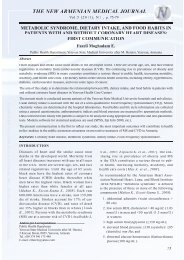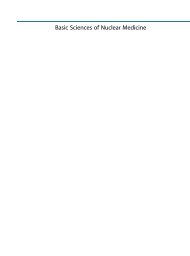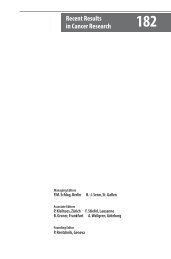Acute Leukemias - Republican Scientific Medical Library
Acute Leukemias - Republican Scientific Medical Library
Acute Leukemias - Republican Scientific Medical Library
Create successful ePaper yourself
Turn your PDF publications into a flip-book with our unique Google optimized e-Paper software.
a 4.7 · Relapsed and Refractory <strong>Acute</strong> Promyelocytic Leukemia 69<br />
Fig. 4.5. Outcome of the 122 APL patients in second hematological<br />
complete remission according to postremission therapy. (A) Relapse-free<br />
survival; (B) event-free survival; (C) overall survival [127].<br />
studies demonstrate that patients with negative PCR<br />
after achieving CR2 will fare well with autologous HSCT<br />
and patients with positive PCR should not routinely be<br />
offered an autologous HSCT.<br />
4.7.5 Gemtuzumab Ozogamicin in Relapsed<br />
<strong>Acute</strong> Promyelocytic Leukemia<br />
Gemtuzumab ozogamicin offers a highly attractive<br />
approach for treatment of APL for several reasons.<br />
Firstly, compared to other AML subtypes, CD33 antigen<br />
is detectable in virtually all cells with a highly homogeneous<br />
expression pattern [129, 130]. Secondly, P-gp, a<br />
mediator of MDR which acts as an efflux pump to extrude<br />
chemotherapy, is minimally expressed on APL<br />
blasts, which accounts for the striking sensitivity of<br />
APL to anti-CD33 strategies [131]. Finally, calicheamicin<br />
is a potent intercalator, similar to anthracyclines, which<br />
are known to be highly effective in APL [132].<br />
GO monotherapy in molecularly relapsed APL has<br />
been well tolerated and is effective [118, 133]. Lo Cocco<br />
and colleagues [118] demonstrated this in 16 such patients.<br />
All patients were treated with two doses of GO<br />
(6 mg/m 2 ), and a third dose was given to patients who<br />
tested negative for PML-RARa fusion transcript. Molecular<br />
response was obtained in nine (91%) of 11 patients<br />
after two doses and in 13 (100%) of 13 patients after the<br />
third dose. Of the three remaining patients, one patient<br />
developed hepatic toxicity after a single dose of GO and<br />
therefore received no further therapy, and remaining<br />
two patients progressed while on treatment. Quantitative<br />
RT-PCR demonstrated that patients who responded<br />
had a dramatic decline (at least 2 logs) of the PML-<br />
RARa transcript following first GO dose. Of 14 responders,<br />
seven remained in sustained molecular remission<br />
for a median of 15 months (range, 7 to 31 months) while<br />
seven relapsed at 3–15 months later. GO was readministered<br />
in two patients in relapse, and both achieved a<br />
molecular remission. Since a high proportion of patients<br />
relapsed, the authors suggested that patients<br />
should be given further treatment (consolidation/maintenance)<br />
after achieving molecular remission to improve<br />
long-term outcome.
















